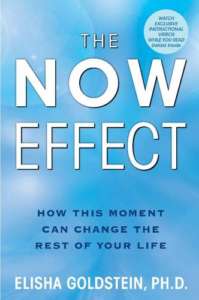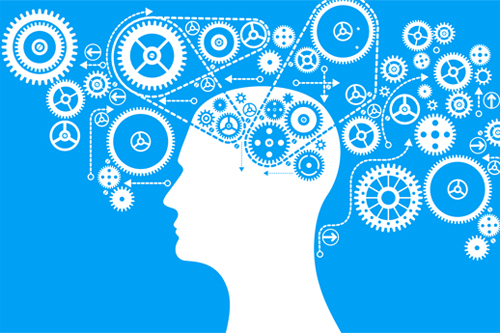

Drawing in equal measures on Buddhist practice, neuroscientific insights into brain plasticity, and therapeutic stress reduction techniques, Elisha Goldstein, Ph.D., has been showing his patients, his readers, and the growing numbers of corporate adopters of his Mindfulness at Work™ program how to achieve the Now Effect—moments of intense mindfulness, transient episodes of clarity into the fullness and purpose of life.
Most people can count the times they’ve had such epiphanies on the fingers of one hand—at their wedding, perhaps, or the birth of their child, or in the wake of one of those generational traumas like the 9/11 attacks or the Kennedy Assassination. But as the subtitle of The Now Effect promises, this very moment you are experiencing now can become an occasion of grace, a “choice point” that could change the rest of your life, or at the very least enable you to achieve greater focus, reduce stress, and conquer addictions and self-destructive patterns of thought, emotions, and behavior. Applying the techniques and practicing the exercises Goldstein recommends will allow you to re-engage with the world directly and fearlessly, as most of us haven’t dared since we were children—and with empathy, equanimity, tranquillity, and love.
Even more intriguingly, readers will learn how to “literally rewire a stronger and healthier brain.” At the nexus of neuroscience, psychology, and Eastern philosophy is the insight that “if you can name it, you can change it.”
 Even more intriguingly, readers will learn how to “literally rewire a stronger and healthier brain.” At the nexus of neuroscience, psychology, and Eastern philosophy is the insight that “if you can name it, you can change it.” When we bring a thought or an emotion out of our subconscious and into our conscious minds, it loses its ability to control us. Consciousness has power—“knowing the way you think and where you place your energy allows you to step away from the various stories and mind traps that don’t serve you and enter the space of awareness where you can consider alternatives for creating a flexible, healthier mind….As you do so, you’ll actually be rewiring your brain and changing the way you think before you think.”
Even more intriguingly, readers will learn how to “literally rewire a stronger and healthier brain.” At the nexus of neuroscience, psychology, and Eastern philosophy is the insight that “if you can name it, you can change it.” When we bring a thought or an emotion out of our subconscious and into our conscious minds, it loses its ability to control us. Consciousness has power—“knowing the way you think and where you place your energy allows you to step away from the various stories and mind traps that don’t serve you and enter the space of awareness where you can consider alternatives for creating a flexible, healthier mind….As you do so, you’ll actually be rewiring your brain and changing the way you think before you think.”
The key to The Now Effect is to use it as a cookbook—to try out the dozens of exercises, techniques, and practices, what Goldstein calls “Now Moments,” and incorporate those that resonate with you into your daily life. One of the book’s niftier features is the Microsoft Tags that are included with some of those exercises. Scan one with your smartphone and Goldstein pops up in a video to lead you through the meditation. One chapter is about the mirror neurons that Giacomo Rizzolatti discovered in the early 1990s, which literally enable empathy in higher mammals (that is why they are also sometimes called Dalai Lama neurons). Hearing Goldstein’s voice, seeing the expression on his face, and falling into step with his pace undoubtedly stimulate those very brain cells; in any event, they provide a powerful supplement to this wise, compassionate, and very useful book.



